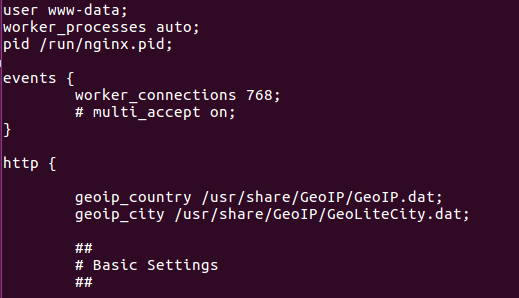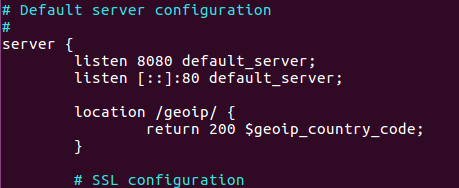To enable GeoIP module on nginx, first install geoIP module. This you can install it with your system package manager or download from maxmind.
On Ubuntu 16.04, i installed GeoIP with command
apt install geoip-database-contrib
Now edit nginx.conf
vi /etc/nginx/nginx.conf
Find
http {
Add below
geoip_country /usr/share/GeoIP/GeoIP.dat; geoip_city /usr/share/GeoIP/GeoLiteCity.dat;

Now test nginx config with command
nginx -t
Restart nginx with
nginx -s reload
At this stage, you can use geoip codes in your nginx virtual host entry.
Lets test it by editing default virtual host entry
vi /etc/nginx/sites-enabled/default
Add inside
location /geoip/ {
return 200 $geoip_country_code;
}

Now access the URL, you will see your country code.
$ curl http://lab.hosthat.com:8080/geoip/ FR$
Passing GeoIP Variables to PHP
Edit /etc/nginx/fastcgi_params
vi /etc/nginx/fastcgi_params
Add
fastcgi_param GEOIP_COUNTRY_CODE $geoip_country_code;
Redirecting Traffic Based on Country Code
In virtual host entry, add
if ($geoip_country_code ~ "A1") {
rewrite ^/(.*)$ http://a1.hostonnet.com/ redirect;
}
if ($geoip_country_code ~ "RU") {
rewrite ^/(.*)$ http://ru.hostonnet.com/ redirect;
}
if ($geoip_country_code ~ "CN") {
rewrite ^/(.*)$ http://cn.hostonnet.com/ redirect;
}
Nginx Echo Module
On Ubuntu/Debian, extra modules can be installed with
apt-get install nginx-extras
Now you will be able to use “echo” command directly from nginx config. Add following to nginx default virtual host
location ^~ /geoip/ {
add_header Content-Type text/plan;
echo 'Your are from country $geoip_country_code\n';
}
echo command is useful for debugging.
See Nginx

